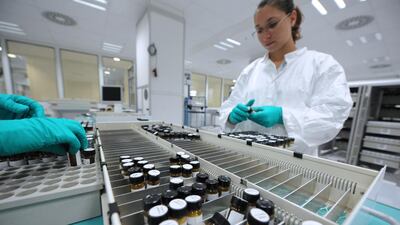A French vaccine could join the world’s arsenal against Covid-19 after a shot developed by France’s Sanofi and Britain’s GSK showed promising results in trials.
France's national pride was wounded when previous trials by Sanofi and the Pasteur Institute showed disappointing results that led to the vaccines being shelved.
But the latest results from Sanofi and GSK showed 95 to 100 per cent of patients developing antibodies in a Phase II trial.
It paves the way for a Phase III trial of the vaccine, which could be available by the end of the year if it is found to be effective.
“Our Phase II data confirm the potential of this vaccine to play a role in addressing this ongoing public health crisis,” said Sanofi’s global head Thomas Triomphe.
The experimental vaccine uses the same technology as one of Sanofi’s seasonal flu vaccines.
After early results in December showed a low immune response in adults, the drug makers said they needed to alter the concentration of the shot.
A second attempt began in February, with 722 people from the US and Honduras involved in the Phase II trial.
Aged 18 to 95, the volunteers were given two doses 21 days apart in a trial which raised no safety concerns among scientists.
Phase III will enrol more than 35,000 people, with trials expected to start in May or June.
They will assess the shot’s effectiveness against the original variant found in Wuhan and the strain identified in South Africa.
Sanofi and GSK will also test the product’s potential use as a booster dose for people who have already been vaccinated.
Several countries are preparing to give out booster shots between six and 12 months after people were vaccinated.
“We believe that this vaccine candidate can make a significant contribution to the ongoing fight against Covid-19,” said GSK president Roger Connor.
The vaccine candidate “will move to Phase III as soon as possible to meet our goal of making it available before the end of the year,” he said.
Sanofi hopes to compete on price by offering its vaccine for $12 per shot or less.
The French firm has purchasing agreements with the US, EU, Britain and Canada, as well as the global Covax scheme.
It is developing a second vaccine with US firm Translate Bio, using the same messenger RNA technology as Pfizer and Moderna.
Sanofi could join global arsenal of Covid vaccines
European Commission chief Ursula von der Leyen identified the Sanofi/GSK vaccine last month as a part of the bloc’s future purchasing strategy.
The EU was embroiled in a months-long struggle to get supplies of vaccines made in the UK and US, such as the Pfizer, Moderna and AstraZeneca shots.
Sanofi's early disappointment was followed by another French failure as the Pasteur institute announced in January that it was abandoning a shot.
The two setbacks left France conspicuously absent among global vaccine developers after successes for Britain, Germany, Russia, China and the US.
It led to widespread dismay in the country of Louis Pasteur, the pioneering scientist who invented the rabies and anthrax vaccines.
“It's a sign of the decline of the country and this decline is unacceptable,” French politician Francois Bayrou said at the time.
Four vaccines – from Pfizer, Moderna, AstraZeneca and Johnson & Johnson – are currently in use in the EU.
EU regulators are also considering whether to approve the Russian-made Sputnik V shot, which is already in use in Hungary.


